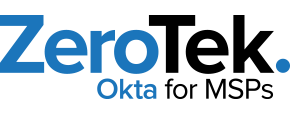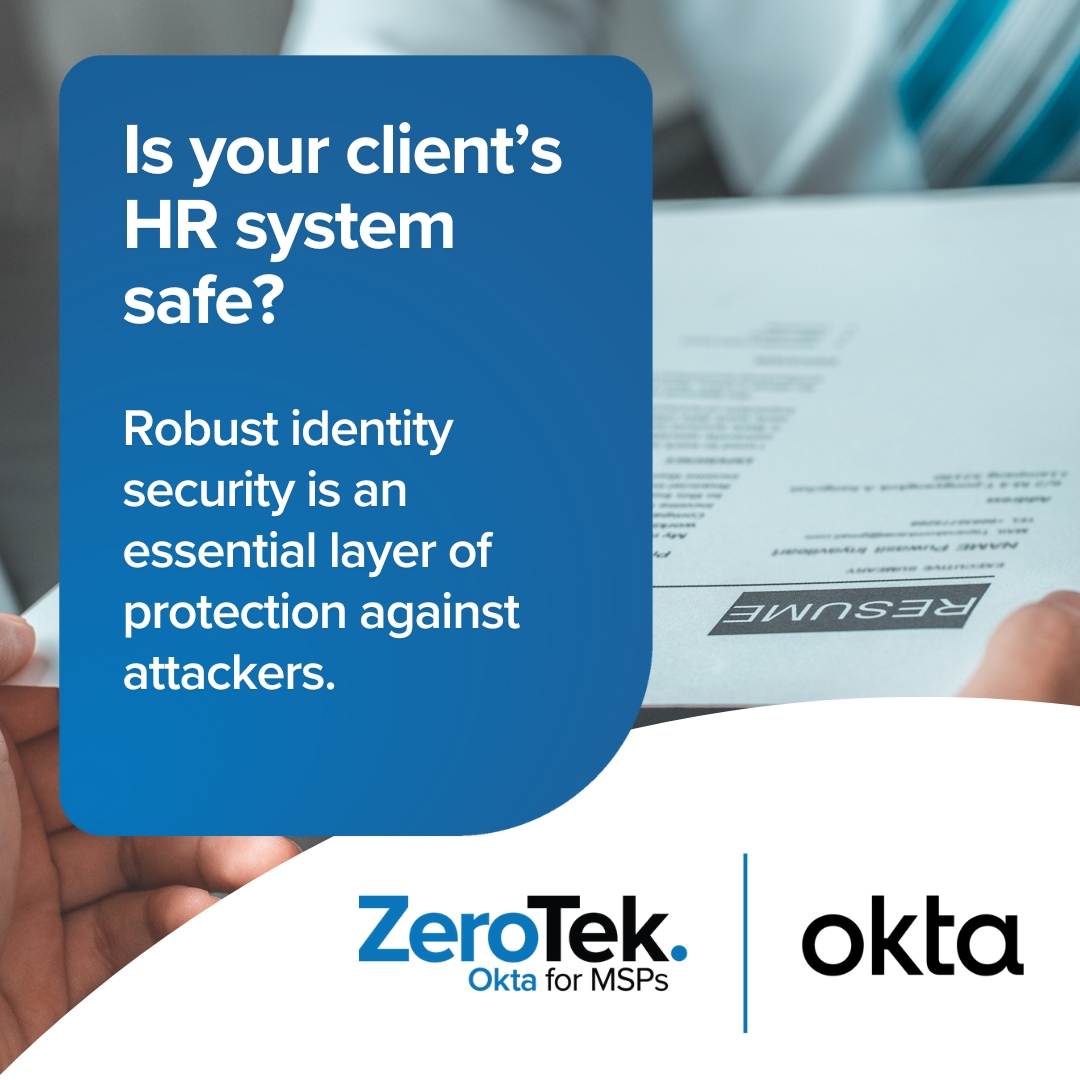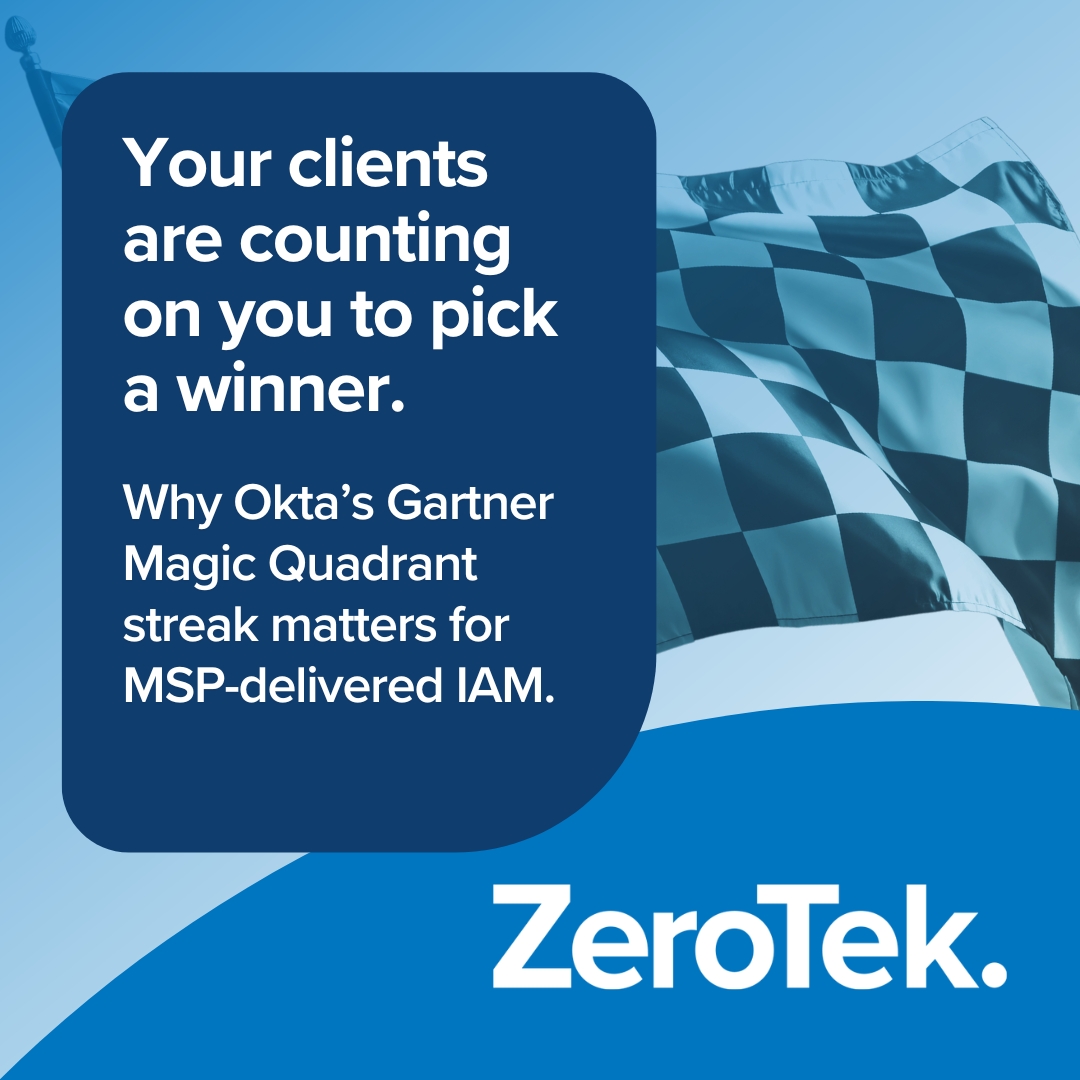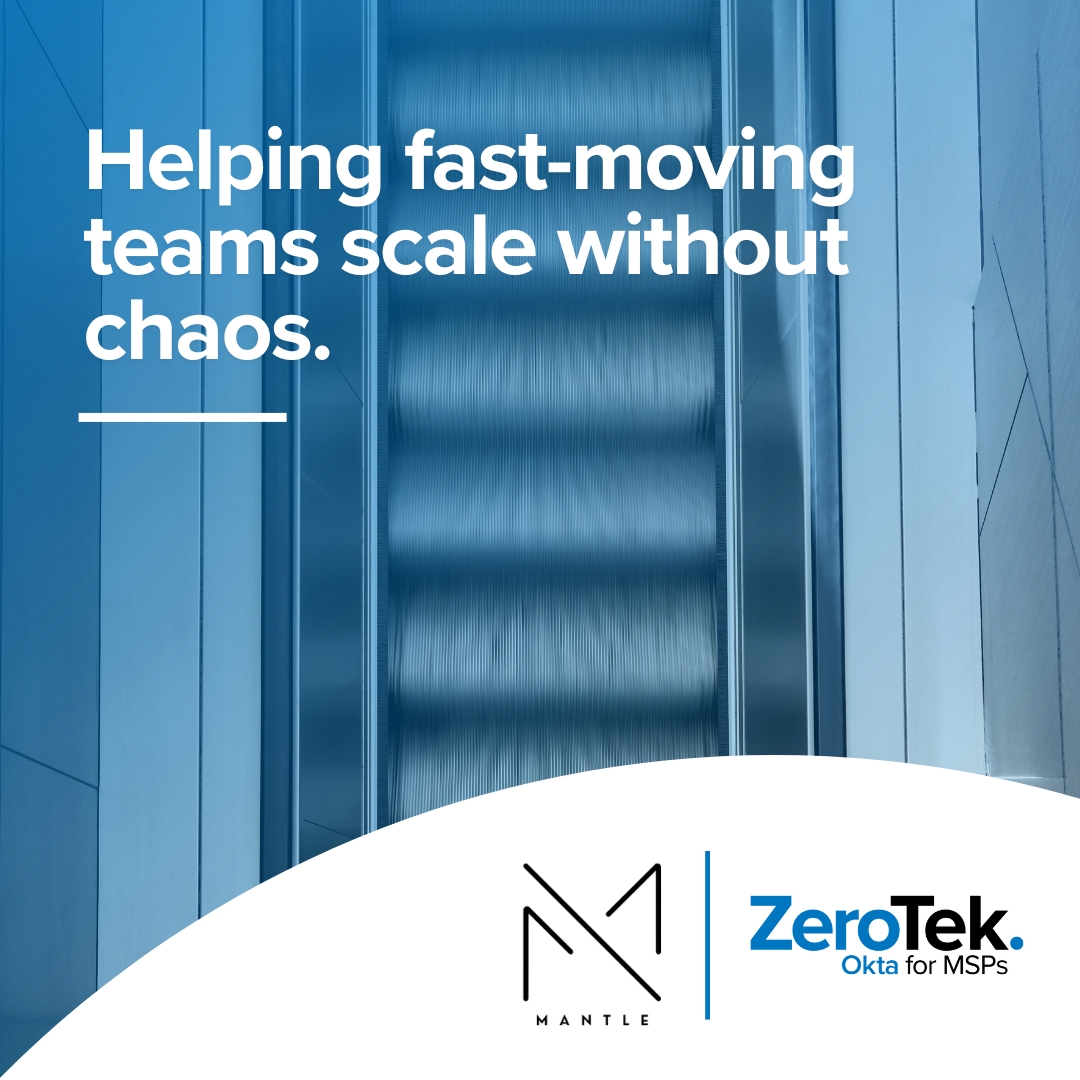Key Takeaways
- HR systems are high-value targets for attackers due to their sensitive data.
- MSPs can reduce breach risk by securing HRIS access with Okta’s identity-first security features.
- Okta Device Trust ensures only compliant, trusted devices can access HR platforms—even if credentials are stolen.
- ZeroTek simplifies how MSPs deploy, manage, and scale Okta-powered IAM across all client environments.
- A modern IAM strategy for HR apps gives MSPs a competitive edge—boosting client trust, compliance, and operational efficiency.
Sections
- HRIS: Not just another SaaS app
- HR apps: a bullseye for identity-based cyberattacks
- The evolving threat landscape: HR impersonation and fraud
- How MSPs use Okta to secure HR systems at the identity layer
- ZeroTek: purpose-built for MSP success
- Use case: protecting SMB payroll with ZeroTek | Okta
- Compliance, trust, and competitive advantage
- Final thoughts: start securing what matters most
Sections
- HRIS: Not just another SaaS app
- HR apps: a bullseye for identity-based cyberattacks
- The evolving threat landscape: HR impersonation and fraud
- How MSPs use Okta to secure HR systems at the identity layer
- ZeroTek: purpose-built for MSP success
- Use case: protecting SMB payroll with ZeroTek | Okta
- Compliance, trust, and competitive advantage
- Final thoughts: start securing what matters most
Key Takeaways
- HR systems are high-value targets for attackers due to their sensitive data.
- MSPs can reduce breach risk by securing HRIS access with Okta’s identity-first security features.
- Okta Device Trust ensures only compliant, trusted devices can access HR platforms—even if credentials are stolen.
- ZeroTek simplifies how MSPs deploy, manage, and scale Okta-powered IAM across all client environments.
- A modern IAM strategy for HR apps gives MSPs a competitive edge—boosting client trust, compliance, and operational efficiency.
HRIS: Not just another SaaS app
You probably don’t think of a job application portal as a cybersecurity risk. But for today’s attackers, Human Resource Information Systems (HRIS)—and the MSPs who support them for SMB clients—are high-value targets. Every HR app login page is a potential phishing hook. Every unprotected account is a data breach waiting to happen.
MSPs are trusted to protect their clients’ sensitive data, and HR platforms are filled with it: social security numbers, salary info, bank details, and even employee disciplinary records. If you’re not securing access to HR systems with enterprise-grade identity and access management (IAM), your clients—and your reputation—are at risk.
In this post, we explore how attackers exploit HRIS, why identity security is critical, and how Okta with ZeroTek empowers MSPs to deliver robust, scalable protection.
HR apps: a bullseye for identity-based cyberattacks
Let’s break it down. An SMB’s HRIS might include:
- Onboarding and offer letters
- Payroll, benefit, and direct deposit data
- Health insurance enrollment
- Performance and termination records
All of that can be accessed through a single login. And too often, that login is a username and password—without MFA or context-based access rules.
Now consider this:
- HR professionals are among the most targeted users for phishing.
- Credential stuffing bots can hammer public login pages 24/7.
MSPs can’t afford to treat HR apps like any other SaaS tool. The exposure is too great, and the reputational fallout from a breach is too severe.
The evolving threat landscape: HR impersonation and fraud
HR systems face threats from two directions—external impersonation and internal compromise—and MSPs must be prepared to defend against both.
Externally, attackers are impersonating company recruiters to phish job seekers. They mimic real job postings, clone career sites, and reach out via email or LinkedIn with convincing offers. Once a target is hooked, attackers steal personal information or distribute malware designed to harvest credentials.
Internally, HR users themselves are at risk—not because they fall for basic phishing scams, but because too many SMBs still rely on insecure login practices. We’ve seen real-world cases where HR accounts are compromised due to:
- Credential reuse across multiple platforms
- Inactive or missing multifactor authentication
- Malware or keyloggers on unmanaged personal devices
- Shared accounts that lack individual accountability
Once an HR account is compromised, attackers gain access to sensitive data—and the ability to alter or exploit it.
Once inside, they can:
- Redirect payroll or other benefits
- View or manipulate employee records
- Manipulate offer letters
- Exfiltrate sensitive PII (personally identifiable information)
- Trigger costly compliance violations
Most SMBs lack the in-house tools to detect these subtle breaches—until it’s too late.
How MSPs use Okta to secure HR systems at the identity layer
With most SMB infrastructure now cloud-first or hybrid, traditional firewalls no longer guard the gates. Identity is the perimeter. And securing identity means more than just enforcing strong passwords. That’s why MSPs use Okta to secure HR systems with adaptive policies and robust device controls.
With Okta’s adaptive, contextual policies and ZeroTek’s MSP-ready management tools, you can enforce stronger security without disrupting your clients’ hiring workflows. Block logins from anonymized IPs, require phishing-resistant MFA, and alert on access anomalies—all from a single pane of glass.
Okta, delivered and managed through ZeroTek, offers a layered, modern defense:
- Adaptive, contextual MFA: Challenge based on location, device health, or risk level. Automatically deny logins from untrusted geographical locations and Tor anonymizer proxies.
- Passwordless options: Okta FastPass and FIDO2 WebAuthn protect against phishing, even if credentials are compromised.
- Lifecycle automation: No more time-consuming manual deprovisioning with its inherent risks and vulnerabilities. With Okta Lifecycle Management (LCM), you can remove all access instantly when employees leave.
- Device trust: Allow only trusted devices that meet strict security requirements to access sensitive systems like HR apps.
- Integrate with everything: With 8000+ prebuilt SSO app integrations, Okta makes it easy to integrate your SMB client’s HR system and control granular access, including for Bamboo HR, Deel HR, PurelyHR, ADP, and more.
Okta’s IAM engine is the most trusted in the enterprise world. ZeroTek brings it to MSPs serving SMBs, giving you all the power without the complexity.
ZeroTek: purpose-built for MSP success
Okta has an outstanding IAM platform—but it isn’t designed for MSPs. ZeroTek is. We bring MSP-centric functionality to our deep Okta integration so you can simplify and scale identity services across your client base.
Here are just a few ways that ZeroTek solves real MSP pain points:
- Multi-tenant dashboard: Manage every client org from a single UI—no jumping between consoles.
- MSP-focused RBAC: Grant granular permissions to technicians per client. Full auditability of actions.
- Automated org creation: Spin up a new Okta org for a client in minutes—no sales process, no delays.
- Billing that fits your model: Only pay for what you use. Bundle Okta into your offerings or bill clients directly. No license pools or renewals to manage.
Use case: protecting SMB payroll with ZeroTek | Okta
Before Okta
A junior HR assistant logs into their company’s HRIS system from a personal laptop. There’s no identity platform in place—just a username and password login to the HR app. It’s a strong password and saved in the user’s password manager, but there is no MFA. No device checks. No conditional access.
The assistant’s login is successful, but the user doesn’t know a roommate who borrowed the laptop accidentally downloaded some malware a few days ago.
Result: The attacker gains access to the HR system from the compromised device and has free rein as a privileged user.
After Okta with device trust
The same HR assistant logs in, but they’re using a trusted device, configured to high security standards, and access is protected by Okta policies managed by their MSP through ZeroTek.
To use the HRIS, the assistant first authenticates using Okta phishing-resistant MFA including biometric and possession-based factors for a passwordless and highly secure login.
Before granting access, Okta performs multiple checks:
- Is the device enrolled and compliant with secure access requirements?
- Is the OS up to date and encrypted?
- Is the user logging in from a trusted network or geography?
Result: With a managed device and authentication hardened through Okta device and identity trust, the risk of unauthorized access is significantly reduced, allowing the HR assistant to work securely. The MSP has delivered a measurable security upgrade without introducing friction.
This is Zero Trust in action—powered by Okta, managed by ZeroTek, and easily delivered at scale. For HR systems, it’s no longer optional.
Compliance, trust, and competitive advantage
SMBs in healthcare, finance, and law must meet regulatory requirements (HIPAA, PCI-DSS, GDPR). ZeroTek helps MSPs deliver the identity controls these laws require, such as:
- MFA enforcement
- Role-based access control (RBAC)
- Geo-restricted logins
- Comprehensive audit trails
This isn’t just about risk reduction. It’s about enabling your clients to win more business by proving their systems are secure—and showing them you’re the trusted advisor who gets them there.
Final thoughts: start securing what matters most
Not every customer will have an HR app—but for every single one who does, the time to secure it with modern IAM is now. You don’t need to be an Okta expert to start. With ZeroTek, you gain a team of Okta-certified consultants, a platform built for MSP workflows, field-tested MSP best practices, and a model that grows with your business. By standardizing how MSPs use Okta to secure HR systems, ZeroTek helps you offer high-value IAM services that scale.
Are you ready?
Ready to explore how ZeroTek | Okta can help your MSP deliver next-level security services to your customers?





